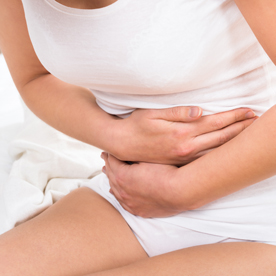
Magnesium is one of the most abundant minerals in the body. It’s found in many foods, so you might expect most of us are getting our fair share. But many people are thought to have low magnesium levels. Women who are low in magnesium levels are thought to be more likely to have polycystic ovary syndrome (PCOS).i
 If you’ve been diagnosed with PCOS, you may have been recommended magnesium as a helpful supplement to assist with certain symptoms of the condition. In this piece, we are going to explore magnesium and its uses in tackling PCOS symptoms.
If you’ve been diagnosed with PCOS, you may have been recommended magnesium as a helpful supplement to assist with certain symptoms of the condition. In this piece, we are going to explore magnesium and its uses in tackling PCOS symptoms.
What is magnesium?
First things first, you need to know what magnesium is. Magnesium is an essential nutrient your body needs to function healthily. Your muscles and nerves need it to work properly. It’s also necessary for your body’s production of an energy molecule called adenosine triphosphate (ATP), which means it’s important for energy production.
Magnesium is needed for blood clotting, blood glucose control and blood pressure regulation, and to block calcium from entering muscle and heart cells. But those are just a few examples – in fact, magnesium is thought to help regulate no fewer than 300 different chemical reactions in the body.
Low magnesium status
According to the British Nutrition Foundation, low intakes of magnesium are common in the UK, with one in five women aged 19 - 34 and more than half of teenage girls getting less than the recommended amount (more than 20 percent of boys aged 11 - 14 are also at risk of low intakes).
There may be several reasons for this. Magnesium levels in our soil may be poor because of intensive farming, leading to low levels in foods. Or it could be down to the fact that some of us aren’t eating enough fruit and vegetables and too many processed foods.
Excessive alcohol consumption and stress can affect magnesium levels. High-protein diets may also be having an effect, as eating a lot of protein may interfere with the body’s ability to absorb magnesium effectively.
PCOS and low magnesium levels
Women with PCOS may be even more likely to have low magnesium levels for the following reasons:
Insulin resistance
Up to 70 percent of women with PCOS are thought to be affected by insulin resistance, which is where your body doesn’t respond normally to insulin. If you’re insulin resistant, you also have a higher risk of developing type 2 diabetes. However, experts believe people with insulin resistance and/or type 2 diabetes may excrete higher-than-normal amounts of magnesium in their urine, and that magnesium deficiency may be associated with the development of insulin resistance.ii
Magnesium absorption
Magnesium absorption can be affected by certain medications, including the contraceptive pill. This is often used as a hormone therapy treatment in women with PCOS who have irregular periods and fertility problems, as well as other PCOS symptoms such as acne and excess facial and body hair.
Other medicines that may interfere with magnesium absorption include certain antibiotics, diuretics (often used to treat high blood pressure) and medicines used to reduce stomach acid called proton pump inhibitors.
Diet
If you’re not getting enough magnesium in your diet, the first things you may notice are general signs such as headaches, weakness, tiredness, nausea, vomiting and loss of appetite. If you don’t take steps to boost your magnesium intake, you may go on to develop more serious symptoms such as numbness, tingling, muscle cramps, abnormal heart rhythms and even seizures. Plus, if your magnesium intake is persistently low, it could lead to an increased risk of developing cardiovascular disease, high blood pressure, type 2 diabetes and osteoporosis.
You can find out if you have abnormal magnesium levels by having a blood test. Your doctor may recommend this as part of a series of tests if you have symptoms such as weakness, nausea or irregular heart rhythms.
Can magnesium improve PCOS symptoms?
Currently there’s a lack of medical studies investigating the use of magnesium as a treatment specifically for PCOS. But there is some evidence it may be helpful in improving insulin resistance, a feature of PCOS, as well as the risk of type 2 diabetes.iii
Improving insulin resistance may help improve several PCOS symptoms, such as irregular periods, excess facial or body hair, oily skin and weight gain.
Some other PCOS symptoms may benefit from improving your magnesium level too, including the following:
Mental wellbeing
A report suggests women with PCOS have a higher risk of being diagnosed with a mental health condition than those without PCOS.iv Recent research has suggested that magnesium may help alleviate mild to moderate depression.v
Heart health
It’s widely acknowledged that having insulin resistance and diabetes can increase your risk of heart disease in later life. Women with PCOS may also have a higher risk of other established cardiovascular risk factors, including high blood pressure.vi However, there is some evidence that suggests taking magnesium supplements on a regular basis may help treat high blood pressure.vii
Fatigue
Sleep disturbances and insomnia – which lead to tiredness during the daytime – have been found to be more common in women with PCOS.viii Many people find a magnesium supplement before bedtime helps them to relax and drift off to sleep. However, there’s a lack of studies confirming this. If you are suffering from fatigue, it could be down to your PCOS, but there are a number of ways you can fight it.
How to get more
According to the NHS, women aged 19 - 64 years require 270mg of magnesium a day. You should be able to get all the magnesium you need from your diet. So which foods should you eat more of to make sure you’re getting the magnesium you need?
Good food magnesium sources include:
-
Green leafy vegetables (e.g. spinach)
-
Legumes
-
Nuts
-
Seeds
-
Whole grains
-
Fortified foods (e.g. breakfast cereals)
-
Fish
-
Meat
-
Dairy foods
Another way to make sure you’re getting enough magnesium is to take a good quality magnesium supplement. There are several different forms of magnesium, including magnesium oxide, citrate and chloride. Studies have found magnesium in the aspartate, citrate, lactate and chloride forms is absorbed more effectively than that found in magnesium oxide and sulphate.ix
Magnesium can also be absorbed effectively through the skin, so try putting some Epsom salts in your bath or sprinkle some salts in a large bowl of water and soak your feet.
There’s lots more to discover about combating PCOS symptoms in our other articles. Explore the rest of our blog for lots of advice and tips.
References:
-
Sharifi, F., Mazloomi, S., Hajihosseini, R., Mazloomzadeh, S. (2012 Jan). Serum magnesium concentrations in polycystic ovary syndrome and its association with insulin resistance. Gynecol Endocrinol. ;28(1):7-11.
-
Chaudhary, D.P. , Sharma, R., Bansal, D.D. (2010). Implications of magnesium deficiency in type 2 diabetes: a review. Biol Trace Elem Res. ;134:119–29.
Tosiello, L. (1996). Hypomagnesemia and diabetes mellitus. A review of clinical implications. Arch Intern Med. ;156:1143-8. Available online: https://www.ncbi.nlm.nih.gov/pubmed/8639008?dopt=Abstract -
Rumawas, M.E. (2006 Dec). Magnesium intake is related to improved insulin homeostasis in the framingham offspring cohort. J Am Coll Nutr. ;25(6):486-92. Available online: https://www.ncbi.nlm.nih.gov/pubmed/17229895
-
Polycystic ovary syndrome is associated with adverse mental health and neurodevelopmental outcomes: a retrospective observational study. Society for Endocrinology BES 2017 Conference, Harrogate, UK. Available online: https://www.endocrinology.org/press/press-releases/women-with-pcos-should-be-screened-for-mental-health-disorders
-
Tarleton, E.K., et al. Role of magnesium supplementation in the treatment of depression: A randomized clinical trial. Available online: https://www.ncbi.nlm.nih.gov/pubmed/28654669
Tarleton, E.K, Littenberg, B (2015 Mar-Apr). Magnesium intake and depression in adults. J Am Board Fam Med. ;28(2):249-56. Available online: https://www.ncbi.nlm.nih.gov/pubmed/25748766 -
Dokras, A. (2008 Jan). Cardiovascular disease risk factors in polycystic ovary syndrome. Semin Reprod Med. ;26(1):39-44. doi: 10.1055/s-2007-992923. Available online: https://www.ncbi.nlm.nih.gov/pubmed/18181081
-
Hatzistavri, L.S.,Sarafidis, P.A.,Georgianos, P.I. ,et al. (2009). Oral magnesium supplementation reduces ambulatory blood pressure in patients with mild hypertension. Am J Hypertens. ;22(10):1070-1075.
-
Fernandez, R.C. ,et al. (2018). Sleep disturbances in women with polycystic ovary syndrome: prevalence, pathophysiology, impact and management strategies. Nat Sci Sleep. ;10: 45–64. Available online: https://www.ncbi.nlm.nih.gov/pmc/articles/PMC5799701
Franik, G. ,et al. (2016 Dec). Sleep disturbances in women with polycystic ovary syndrome. Gynecol Endocrinol. ;32(12):1014-1017. Available online: https://www.ncbi.nlm.nih.gov/pubmed/27348625 -
Walker, A.F., Marakis, G., Christie, FC, Byng, M. (2003). Mg citrate found more bioavailable than other Mg preparations in a randomized, double-blind study. Mag Res. ;16:183-91. Available online: https://www.ncbi.nlm.nih.gov/pubmed/14596323
Ranade, V.V., Somberg, J.C. (2001). Bioavailability and pharmacokinetics of magnesium after administration of magnesium salts to humans. Am J Ther. ;8:345-57. Available online: https://www.ncbi.nlm.nih.gov/pubmed/11550076
Related Posts?
Disclaimer: The information presented by Nature's Best is for informational purposes only. It is based on scientific studies (human, animal, or in vitro), clinical experience, or traditional usage as cited in each article. The results reported may not necessarily occur in all individuals. Self-treatment is not recommended for life-threatening conditions that require medical treatment under a doctor's care. For many of the conditions discussed, treatment with prescription or over the counter medication is also available. Consult your doctor, practitioner, and/or pharmacist for any health problem and before using any supplements or before making any changes in prescribed medications.

Olivia
Olivia Salter has always been an avid health nut. After graduating from the University of Bristol, she began working for a nutritional consultancy where she discovered her passion for all things wellness-related. There, she executed much of the company’s content marketing strategy and found her niche in health writing, publishing articles in Women’s Health, Mind Body Green, Thrive and Psychologies.
View More



